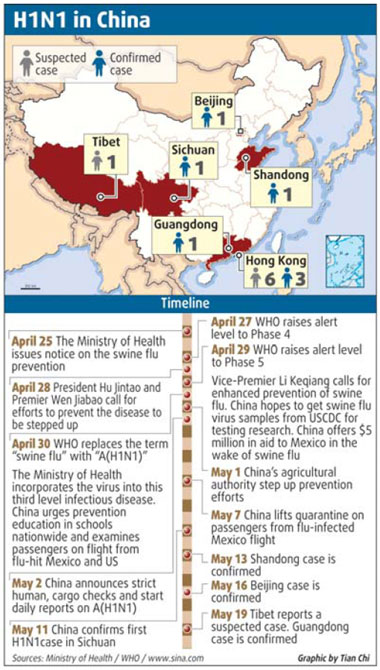
|
CHINA> National
 |
|
Fast response helps ease flu threat
By Wang Zhuoqiong and Cui Xiaohuo (China Daily)
Updated: 2009-05-20 10:21 As part of its proactive response, China established eight working groups made up of experts from the CDC, Ministry of Health and General Administration of Quality Supervision, Inspection and Quarantine, as well as ministries of agriculture, foreign affairs, science and technology.
The weak link, however, has again proved to be monitoring and tracking of the nation's vast mobile population. When a student returning to Shandong province by train after flying in to Beijing from Canada called a local CDC to tell them he had a terrible fever, he became the mainland's second confirmed case of the H1N1 flu. But even though health workers rushed to meet him from the train, not one person who shared his carriage was tested for the virus. It was left to the local authority to trace his fellow passengers and quell any potential danger. Also, during the first wave of panic over the outbreak, some Mexican citizens traveling to China complained of being quarantined simply because of their nationality. Gustavo Carrillo, a Mexican businessman quarantined at the Guomen Hotel in Beijing this month, told China Daily: "This is more than just caution. I feel discriminated against." Carrillo was escorted straight to a quarantine site upon landing at Beijing on a Continental Airlines flight from New York after he showed his Mexican passport. However, the authority later relaxed its isolation policy when more details on the virus became available. Passengers on a flight with the third confirmed patient were not tested because the sufferer's latent period had occurred after she got off the plane. "The system reacts with the epidemic and is very flexible," explained expert Xue, who said that because of its 1.3 billion population and densely populated cities, what China did to prevent the spread will have important repercussions for the rest of the world. However, the tighter prevention measures and strict quarantine practice have been hotly debated among the public and the media in China. After front-page stories on the outbreak for nearly a month, the public has been naturally concerned with how the government measures will affect their lives, while the media, probing further into the potential pandemic, has questioned whether the measures have really worked. This may explain why several blogs written by quarantined patients, such as Zhong Shuang, have attracted millions of hits on the Internet. From photographs of fruit juggling displays to explicit details of the tests they must endure, the bloggers have given their readers a firsthand account of where the hundreds of yuan being spent by central government each day to prevent the spread of the H1N1 flu is going. Associated Press writer Will Weissert on Monday also joined this unique "press pack" when he and his Chilean wife were quarantined in Shanghai after arriving following a stopover in Cancun, Mexico. The Cuba-based reporter, who said he had no contact with a suspected or confirmed flu patient, was forced to missed his friend's wedding because of the measures. "The public read about the people in quarantine because they wanted to know how it all works and how they are treated," Zhong told China Daily. A market director for a software company, her six-day enforced stay in a remote Beijing hotel ended last Saturday, and she said the people she was quarantined were treated well and believed the government was trying to avoid the worst case scenario. However, Mexican businessman Gustavo Carrillo disagreed and, even though the Guomen recruited extra cleaning staff, and offered Western meals and English newspapers, he told China Daily he felt he had been "under-treated in a deserted hotel". "Chinese or foreign, nobody likes to be quarantined, have their liberty removed," said Xue at Tsinghua University. "But the Chinese public are more vigilant over the outbreak of disease after the suffocating SARS experience." He admitted, however, China had "over-reacted" with its treatment of foreigners traveling from outbreak regions. But some of China's netizens have pointed the fact the most cases have been reported in the US, a country with far less strict quarantine rules, while the first three confirmed patients in the Chinese mainland were all students returning from the US for a summer vacation. And others in the media, which has covered the spread of the disease around the clock, suggest the danger from virus had been exaggerated. Wu Peng, a reporter with Beijing News, said the H1N1 strain, which has had a much lower fatality rate than the H5N1 avian flu and the seasonal flu, said: "I want to give the public a real picture of the influenza and not play up anything."

|